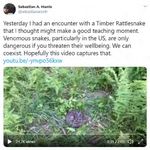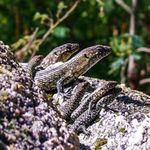The Buzz Advocates for Snake Preservation
←
→
Page content transcription
If your browser does not render page correctly, please read the page content below
The Buzz
Advocates for Snake Preservation
Changing how people view & treat snakes Summer 2020 • #04
Happy World Snake Day!
Rattlesnake fights are rarely lethal, but always beautiful.
July 16 is World Snake Day: an
opportunity to celebrate snakes Rattlesnake combat is an elaborate
and raise awareness about their wrestling match, where each snake
conservation. While snakes are tries to topple the other. They rarely
threatened by many of the same issues bite during combat and there is little
that affect all wildlife (habitat loss, rattling. In fact, the contest can be so
climate change, and disease), negative tranquil that it is often mistaken for
attitudes toward snakes may be the courtship between a male and female.
biggest barrier to their conservation
because it often impedes efforts to
address other threats.
We encourage everyone to use this
day to share positive stories about
snakes with their friends and families.
Need some inspiration? We’ve got you
covered. Jaydin fights Marty over Persephone (Black-tailed Rattlesnakes).
Rattlesnakes take care of their kids. Some snakes are social.
Sometimes their friends’ kids too.
Indeed they are, as are many other reptiles
and their social behavior is more like birds and
mammals than many guess! We found that
Arizona Black Rattlesnakes have friends and
individuals they avoid within their community.
For more on this topic, check out “Secret
Societies: The Social Lives of Reptiles,” by Gordon
Burghardt, on the next page.
Adrian, pregnant Arizona Black Rattlesnake, babysitting a
nestmate’s kids.
Rattlesnake babies are born alive and stay with
mom a week or two until they shed their skin.
Mom keeps them safe during this vulnerable
time. At communal nests, pregnant rattlesnakes
and visiting males may babysit the babies too.
Arizona Black Rattlesnake social group drinking together.Secret Societies: The Social Lives of Reptiles
Sociality in reptiles, particularly snakes, has been
long misunderstood and even denied. Today it
is well-established that many crocodilians have
complex courtship rituals and parental care that
is far more extensive than that found in many
birds and mammals. Cooperative hunting has
even been described. Turtles develop dominance
relationships and recently it has been discovered
that many have social vocalizations, particularly
aquatic species. One South American river turtle
is truly amazing. Mothers migrate up the river Arizona Black Rattlesnake family.
over a hundred miles to lay their eggs in large
communal nesting aggregations and then depart
downriver. When the eggs are about to hatch Territorial and dominance relationships in wild
the mothers return to the nesting beaches, the snakes is seemingly uncommon, but does
hatchlings and mothers vocalize to each other, occur and is probably more common than we
the hatchlings move into the river, and then the think. Snakes, all being obligate carnivores,
hatchlings follow the mothers back downstream. and most relying on large prey, compared to
Whether this is just a communal response or insectivorous lizards, are often at low densities
mothers and hatchlings recognize each other in the wild and thus their social relationships not
is still not known, but this is one of the major easily recognized or studied. Yet studies show
recent discoveries showing how much is still that many species go to seasonal hibernacula
unknown about reptile behavior and the endless to brumate over winter and individuals have
opportunities for major discoveries. preferred partners for resting and basking – even
perhaps, friendships. Recent laboratory studies
Lizards have been with Common Gartersnakes show that juvenile
known for decades snakes develop social partners as well. A number
to have territorial of species of snakes stay with their eggs and
systems as well as defend them. Mother rattlesnakes, who give live
dominance hierarchies, birth, are known for staying with their offspring
though there is great for days and there are even reports of males
variation in sociality, defending females and offspring from predators.
even within closely Snakes often compete for food in captivity and
related groups. this can lead to social preferences or avoidance.
Parental care is also Cunningham’s Skink family, Some male pit vipers have dramatic wrestling
present, especially photographed by Julia Riley. matches, often to impress nearby lurking female
in skinks and many with whom they want to mate. We are just on
also guard their eggs. And some skinks have the cusp of finding out how social snakes can be.
long-term monogamy and family ties that span It is important, of course, to view snakes from
generations. There is even evidence of kin- their sensory and perceptual worlds, and not
based altruism in green iguanas. The colorful ours. Thus, for most snakes and many lizards,
markings, dewlaps, and crests are used in social chemical cues are more important than visual and
communication along with head-bobbing and auditory cues, but these we cannot personally
other behavior. perceive ourselves and thus are prone to ignore.
The secret lives of snakes are still largely secret.
Snakes have long been considered solitary
except for seasonal mating rituals. In a number - Gordon M. Burghardt, PhD, Board of Directors, ASP
of species, mating aggregations are large and
References available at: snakes.ngo/reptile-sociality
dramatic.We Envision a World Where ALL are Respected
and Appreciated Instead of Feared and Hated.
The last few months, and dual pandemics, have been personally and
professionally challenging. We trust science, so how to handle COVID-19 has
been pretty straight-forward: online events only, more hand-washing, wear masks,
etc. Our role in fighting systemic racism has been less clear. What is clear is that
staying silent and doing nothing is not an option.
Until all humans are treated with respect, our mission cannot be realized. The
mindset of those who persecute snakes, and the culture that condones it, come
from the same place as systemic racism: fear and hatred, especially of those
perceived to be different. Thus, we support all who promote compassion and
oppose fear and hate. While we continue our advocacy for snakes, we’re listening
and learning for ways we can support the fight to end systemic racism.
Melissa admires a pink
Melissa Amarello Coachwhip.
Executive Director, ASP
Gophersnake.
Colorful Coachwhips
Be a Snake Hero!
Snakes deserve a voice and together we
give them one. Your gift brings us closer to
a world where snakes are respected and
appreciated instead of feared and hated.
Name
Address
A courting pair of Coachwhips
City State Zip
Coachwhips come in a
variety of colors: black, pink,
and everything in between. Email
Color doesn’t indicate sex
and multiple color morphs Make your check payable to:
can coexist in some places.
Advocates for Snake Preservation
and send to:
PO Box 2752, Silver City, NM 88062
You can also donate online at:
www.snakes.ngo/donateThe Buzz
NonProfit Org
U.S. Postage
PAID
Permit 541
85713
Advocates for Snake Preservation
PO Box 2752 • Silver City, New Mexico 88062 Summer 2020 • #04
Gophersnake.
Advocates for
Snake Preservation
#SnakeHero
uses science, education,
and advocacy to promote In his video, conservationist, ecologist, and #SnakeHero,
compassionate conservation Sebastian Harris, explains what to do if you encounter a
and coexistence with snakes. rattlesnake while hiking.
Who We Are “Walk around them
and enjoy the rest
Melissa Amarello, of your day.
Executive Director It’s that simple.”
Jeff Smith, Director of Find out more about
Research Sebastian and his work
Steve Marlatt, Vice-Chair with snakes and other
of the Board of Directors wildlife on his website:
Gordon M. Burghardt, SebastianAronH.com
PhD, Board of Directors
Pinned at twitter.com/sebastianaronh
The Buzz is published by
ASP for our supporters.
Questions, suggestions, or View and share our new Snake Country Travel Guide for
comments? Contact us at: more information on hiking, biking, climbing, and camping
info@snakes.ngo safely in snake country: LivingWithSnakes.org/travelYou can also read


























































